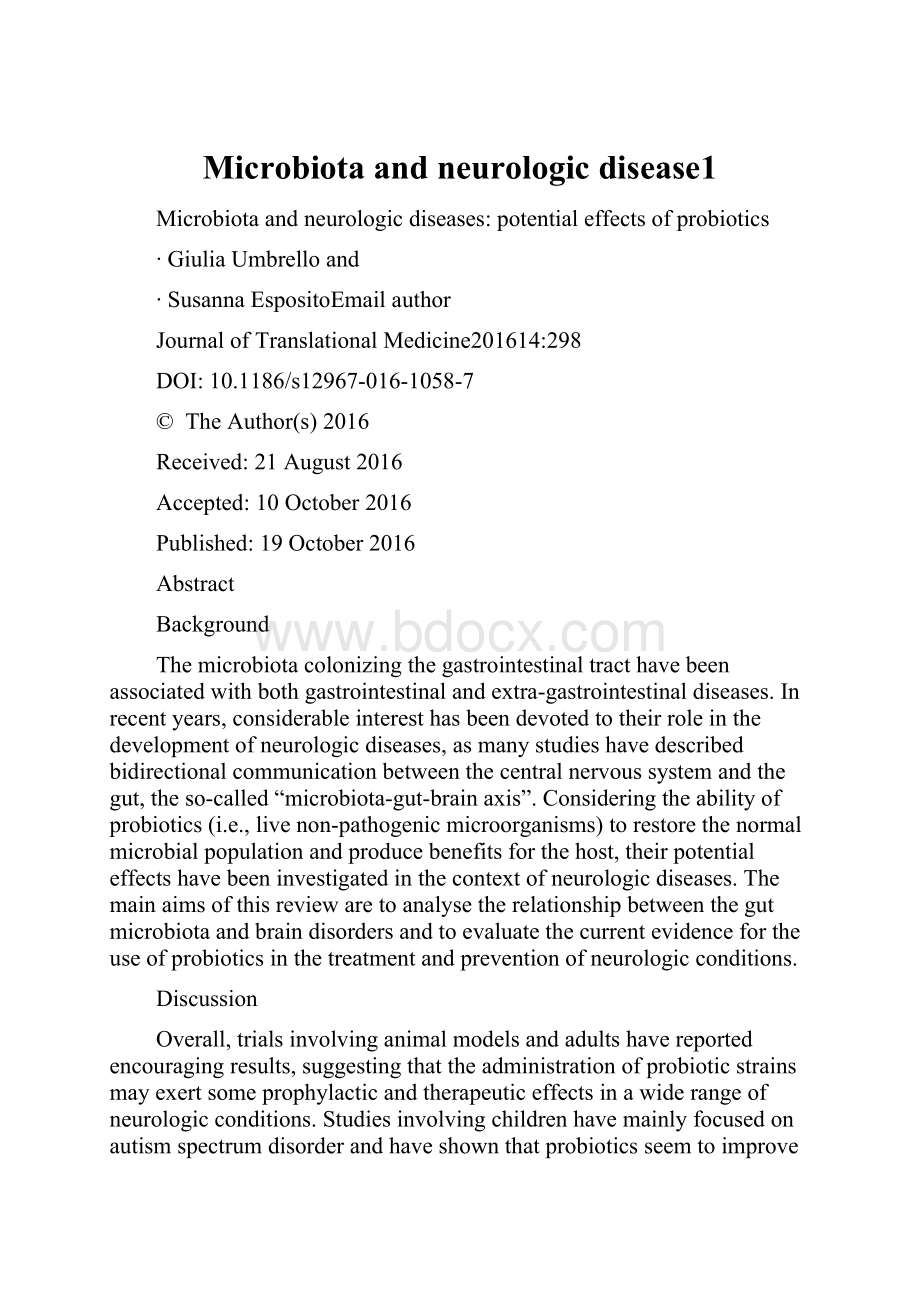Microbiota and neurologic disease1.docx
《Microbiota and neurologic disease1.docx》由会员分享,可在线阅读,更多相关《Microbiota and neurologic disease1.docx(33页珍藏版)》请在冰豆网上搜索。

Microbiotaandneurologicdisease1
Microbiotaandneurologicdiseases:
potentialeffectsofprobiotics
∙Giulia Umbrello and
∙Susanna EspositoEmailauthor
JournalofTranslationalMedicine201614:
298
DOI:
10.1186/s12967-016-1058-7
© TheAuthor(s) 2016
Received:
21 August 2016
Accepted:
10 October 2016
Published:
19 October 2016
Abstract
Background
Themicrobiotacolonizingthegastrointestinaltracthavebeenassociatedwithbothgastrointestinalandextra-gastrointestinaldiseases.Inrecentyears,considerableinteresthasbeendevotedtotheirroleinthedevelopmentofneurologicdiseases,asmanystudieshavedescribedbidirectionalcommunicationbetweenthecentralnervoussystemandthegut,theso-called“microbiota-gut-brainaxis”.Consideringtheabilityofprobiotics(i.e.,livenon-pathogenicmicroorganisms)torestorethenormalmicrobialpopulationandproducebenefitsforthehost,theirpotentialeffectshavebeeninvestigatedinthecontextofneurologicdiseases.Themainaimsofthisreviewaretoanalysetherelationshipbetweenthegutmicrobiotaandbraindisordersandtoevaluatethecurrentevidencefortheuseofprobioticsinthetreatmentandpreventionofneurologicconditions.
Discussion
Overall,trialsinvolvinganimalmodelsandadultshavereportedencouragingresults,suggestingthattheadministrationofprobioticstrainsmayexertsomeprophylacticandtherapeuticeffectsinawiderangeofneurologicconditions.Studiesinvolvingchildrenhavemainlyfocusedonautismspectrumdisorderandhaveshownthatprobioticsseemtoimproveneurobehaviouralsymptoms.However,theavailabledataareincompleteandfarfromconclusive.
Conclusions
Thepotentialusefulnessofprobioticsinpreventingortreatingneurologicdiseasesisbecomingatopicofgreatinterest.However,deeperstudiesareneededtounderstandwhichformulation,dosageandtimingmightrepresenttheoptimalregimenforeachspecificneurologicdiseaseandwhatpopulationscanbenefit.Moreover,futuretrialsshouldalsoconsiderthetolerabilityandsafetyofprobioticsinpatientswithneurologicdiseases.
Keywords
Autismspectrumdisorder Brain Gutmicrobiota Microbiota Probiotics
Background
Inrecentyears,thegutmicrobiotaresidinginthegastrointestinaltracthaveemergedasatopicofgreatinterestinmedicalresearch.Thegutmicrobiotaconsistoftrillionsofmicroorganismsrepresentingmanydifferentspeciesofknownbacteria,aswellasviruses,fungi, protozoa and archaea [1, 2].Amongthevariousbacteria,themostabundantphylaare Bacteroidetes and Firmicutes,followedby Proteobacteria andActinobacteria,while Fusobacteria and Verrucomicrobia arelesscommon.Butyrate-producingbacteriaandlacticacidbacteriaarethoughttohavebeneficialeffectstothehostthroughanti-inflammatory,anti-tumourigenicandpathogen-exclusionproperties[3].
Thedeepinfluenceofthegutmicrobiotaonhumanhealthandhomeostasishasmanyclinicalmanifestations.Studieshaveshownhowdysbiosis(i.e.,adisruptionofthebalancedcompositionofthegutmicrobiota)isassociatedwithgastrointestinal[4, 5, 6, 7]andextra-gastrointestinaldiseases[8, 9, 10].Moreover,recentinvestigationshavealsoadvocatedapossibleroleformicrobiotainthepathogenesisofseveralbraindisorders[11, 12, 13].Theemergingideaofthemicrobiotaasamodulatorofneuralphysiologyhasrecentlybeeninvestigatedthroughtheconceptofthe“microbiota-gut-brainaxis”,whichrepresentsacompositemodelofinteractionbetweentheintestinalmicrobesandthebrain.Despitetheevidenceofsuchcommunication,theeffect,magnitudeandclinicalrelevanceofthedisruptionofthemicrobiotainneurologicdiseaseshaveyettobeclearlyelucidated.
Inviewoftheseconsiderations,thepotentialroleofprobioticsinthepreventionandtreatmentofneurologicdiseasespresentsanattractivepossibility.Probioticsarelivingnon-pathogenicmicroorganismsthatconferahealthbenefitandimprovephysiologicalconditionsinthehostwhenadministeredinadequateamounts,asafoodingredient,supplementordrug[14].Probioticsaremainlycomposedoflactic-acidbacteria,suchas Lactobacilli,Lactococci and Bifidobacteria oryeastsas Saccharomycetes;todate,LactobacillusrhamnosusGG,Lactobacilluscasei,Lactobacillusplantarum,Lactobacillusjohnsonii,Bifidobacterium and Saccharomycesboulardii arethemostwidelystudiedstrains[15].
Althoughtheexactmodeofactionofprobioticsremainsuncertain,itislikelythatseveralmechanismsoperatetogether.Probioticsexertamicrobiologicalfunctionbypreventingopportunisticpathogensfromoccupyingfunctionalnichesinthegutmicrobialcommunity,blockingepithelialattachmentofpathogenicbacteria,inhibitingtheirgrowthwiththeproductionoflacticacid,propionicacid,aceticacid,bacteriocinsandreactiveoxygenspecies[16, 17, 18, 19];theyalsoplayanutritionalrolebyproducingseveralvitamins,lactaseandhealth-promotingcompounds[16, 17, 18, 19].Inaddition,theyregulateintestinaltransitandreinforcethegutbarrier.Furthermore,probioticsplayanimportantroleintheregulationofboththeinnateandadaptiveimmunesystemsbyactivatingmacrophages,NKcellsandcytotoxicTcells,modulatingtheproductionofIgA,stimulatingtoll-likereceptorsandmodifyingthecytokine-expressionprofile[16, 17, 18,19].
Somedifferencesinbiologicalpropertiesandclinicaleffectshavebeenreportedamongthevariousprobioticstrains,mainlycausedbygeneticdiversityandhost-bacteriainteractions[20].Agreatdealofevidencehasestablishedthattheeffectsofprobioticsmaybegenus-specificandevenspecies-orstrain-dependent[21, 22, 23]andthattheirefficacyisinfluencedbythedose[24].Moreover,therearedifferencesevenbetweensingle-andmulti-strainprobioticformulations;however,itisnotclearwhethersupplementationwithmixturesisbetterthanusingasinglestrain.Onexaminationof16comparativestudies,probioticcombinationsappearedtobemoreeffectivethansinglecomponentstakenalonein12cases(75 %)[25],althoughinmanystudies,thiscomparisonisbiasedbecauseofdifferencesindose.Itispossiblethatthepresenceofawidevarietyofprobioticgenerainamulti-strainpreparationleadstolowerefficacybecauseofmutualinhibitionbydifferentspecies.However,therearedatasupportingtheideathatmixtureshavesuperioreffectivenessoversinglestrains,possiblybecauseofagreaterconcentrationofprobiotics,abroaderrangeofactionandsynergisticeffects[26].
Probioticsareusedasanadjuvanttherapyformanypaediatricgastrointestinalandextra-intestinaldiseases,butfewdataareavailableontheiruseinbraindisorders.Themainaimsofthisreviewaretoanalysetherelationshipbetweenthegutmicrobiotaandbraindisordersandtoevaluatethecurrentevidencefortheuseofprobioticsinneurologicconditions.Particularattentionispaidtofactorsthatconditionthemodificationofthegutmicrobiotaandthepossibilityofmanagingneurologicaldiseasesbymodifyingthegutmicrobialcomposition.PubMedwasusedtosearchforallofthestudiespublishedoverthelast15 yearsusingthekeyword“microbiota”and“gut”or“intestinal”and“nervoussystem”.Morethan350articleswerefound,andonlythosepublishedinEnglishandprovidingdataonaspectsrelatedtoneurologicdiseaseswereincludedintheevaluation.
Discussion
Themicrobiota-gut-brainaxis
Accumulatingevidencehasshownthatgutmicrobiotainfluencehumanbraindevelopmentandfunction[27,28, 29, 30].Theexchangeofregulatorysignalsthroughanintegrative,bidirectionalcommunicationbetweenthegastrointestinaltractandthecentralnervoussystemrepresentsthegut-brainaxis[31, 32].Inthisrelationship,thegutmicrobiotaplayapivotalrole.Thiscomplexsystemactsviadirectandindirectmechanismsthatinvolveneural,hormonalandimmunologicalpathways[33, 34, 35].
Intop-downsignalling,thecentralnervoussysteminfluencesthegutmicrobiota,mainlythroughtheautonomicnervoussystemandthehypothalamus–pituitary–adrenalaxis.Indeed,severalstudieshavedemonstratedthatastressfulevent,especiallyearlyinlife,candisruptthemicrobiotaprofile,limititsrichnessanddiversity,andaffectbacterialspecies[36, 37, 38, 39, 40],inducingashiftinmicrobialcompositionthatmaypromotethetranslocationofspeciesknowntoinduceinflammation,suchasClostridia,andreducetheproportionofanti-inflammatorybacteria,suchas Lactobacillus.
Anotherpathwaythatcanproduceeffectsonthebrainandbehaviourinvolvesthevagusnerve[41].Themodulationofthegutmicrobiotausing Lactobacillusrhamnosus stimulatedthetranscriptionofγ-aminobutyricacid(GABA)receptorsandinducedbehaviouralandpsychologicalresponseswithmarkeddependenceonvagalintegrity[42].However,vagus-independentmechanismsareinvolvedaswell[33].Theintestinalmicrobiotahasaprofoundinfluenceonseveralneurotransmittersandneuromodulators,suchasmonoamines,serotonin,GABA,andbrain-derivedneurotrophicfactor[43, 44, 45, 46],whichdeliversignalstothebraintroughentericnerves,enterochromaffincells[27]andthesystemiccirculation,crossingtheblood–brainbarrier[34],whosepermeabilityappearstoberegulatedbythemicrobiotainexperimentalmodels[47].
Moreover,thegutmicrobiomeinducesmaturationofthehostimmunesystem,contributestoestablishingadurableimmunerepertoireandmodulatestheinnateandadaptiveimmunesystemstosupportthedominanceofregulatorynetworksthatpreventinflammationorimmune-mediateddiseaseandinflammatoryresponses[48, 49].Inaddition,microbiotaprotecttheintestinalbarrierbyimprovingepi